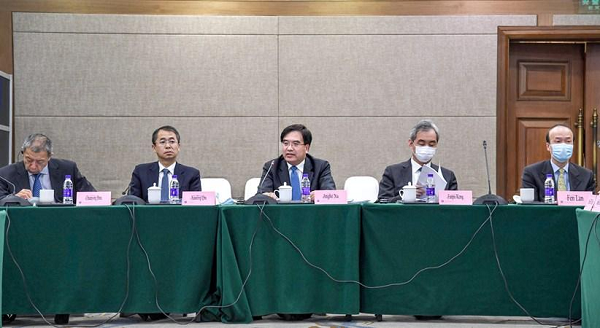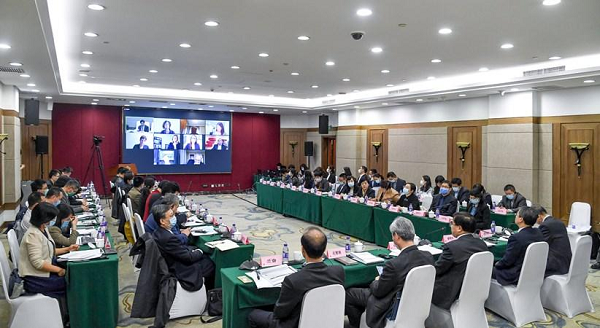NMPA holds symposium on process and prospects of ICH in China
The National Medical Products Administration (NMPA) held a symposium on the process and prospects of the International Council for Harmonization of Technical Requirements for Pharmaceuticals for Human Use (ICH) in Beijing on April 7 to review the progress of China's participation in the ICH and discuss follow-up work plans. Xu Jinghe, Deputy Commissioner of the NMPA, attended and spoke at the symposium.

China started to reform its drug review and approval system in 2015. China's drug regulatory authority joined the ICH in 2017, and was elected as a member of the ICH Management Committee in 2018. Since then China's drug registration administration system has accelerated its integration with international practices.
To date, China has transformed and implemented 46 ICH guidelines by issuing announcements on application or application recommendation of ICH guidelines and publishing the Chinese version of original ICH guidelines, and assigned 69 experts to participate in the in-depth coordination of ICH issues.

Deputy Commissioner Xu said that China's accession to the ICH is of great importance to both sides. In the past few years, China has attached great significance to the promotion of the rule of law in drug regulation, and has accelerated the integration of its drug regulatory policies, laws, regulations, standards and guidelines with international rules and practices. Emphasis has been put on the scientific process of drug regulation and advancing an action plan for scientific drug regulation, and close attention has been paid to the ICH's cutting-edge development to further enhance the country's perspective, keenness, flexibility and adaptability in the field. Constant efforts have also been made to deepen the reform of the drug review and approval system to keep up with international standards in terms of management measures and regulatory requirements and to maximize the innovation vitality of the pharmaceutical industry. China has also sped up construction of a guideline system and the transformation and implementation of the ICH guidelines to improve the international level of drug regulation.
It was pointed out at the meeting that the NMPA will adhere to a scientific, law-based, international and modern development path, continue to deepen reform and innovation, improve the guideline system, and accelerate the implementation of the ICH guidelines in China. More efforts will be made to comprehensively enhance exchanges and cooperation with international regulatory agencies and industries to promote international regulatory data sharing and mutual recognition. ICH related experts will also be invited to join in the training for enterprises on the implementation of the ICH guidelines. In addition, the NMPA will further participate in the formulation and revision of international standards and rules and contribute more Chinese wisdom and strength to global drug regulation.
The symposium was held online and offline simultaneously. Officials of the NMPA's relevant departments and affiliated institutions and representatives of related industry associations in Beijing attended the symposium on site. Representatives of international industry associations attended the symposium online.
The NMPA's official in charge of ICH Office briefed on the progress and follow-up plans for China's transformation and implementation of the ICH guidelines and related training and publicity programs. The official of the NMPA's Department of Drug Registration shared information on how the reform of drug review and approval system can better support the implementation of ICH guidelines.
A number of representatives from domestic and foreign industry associations were invited to the symposium.
Hong Chow, vice-chairperson of the China Association of Enterprises with the Foreign Investment R&D-based Pharmaceutical Association Committee (RDPAC), said that the reform of the drug regulatory system, including joining ICH, has strongly promoted China's drug development and pharmaceutical innovation. A new chapter in China’s pharmaceutical innovation has opened, with a remarkable increase in clinical trial applications and market approvals of innovative drugs and a rising number of innovative drugs coming into the market simultaneously both inside and outside China, she said.
The NMPA has made significant progress in implementing the ICH guidelines and has contributed to the work of the ICH Management Committee, according to Janet Vessotskie, a representative of the Pharmaceutical Research and Manufacturers of America.
Nick Cappuccino, a representative of the International Generic and Biosimilar Medicines Association (IGBA), highly affirmed and praised the Chinese government for its support for and participation in the ICH process, and said the IGBA hopes to cooperate with China to promote the ICH process in generic drugs and biosimilars.
Other participants joining discussion at the symposium included Kang Wei, chief executive officer of the RDPAC, Pär Tellner, a representative of the European Federation of Pharmaceutical Industries and Associations, Masafumi Yokota, a representative of the Japan Pharmaceutical Manufacturers Association, Sharon Olmstead, a representative of the International Federation of Pharmaceutical Manufacturer and Associations, Xiaoqing Boynton, a representative of the Biotechnology Innovation Organization, and Aurelie Farfaro, a representative of the World Self-Medication Industry.
Participants at the symposium discussed topics such as the implementation of the ICH guidelines and deep engagement in the formulation of international rules, and spoke highly of the achievements China has made in ICH related work.
